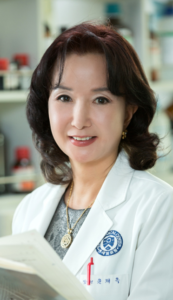
Tell us a bit about your career as a scientist and Professor and what a typical day looks like for you. What is the most rewarding part of your role?
As a scientist and a professor, my typical day is focused on teaching the younger generation of engineering students and expanding on my own research. I teach both undergraduate and graduate students in bioengineering as well as guide the students at my lab, aiming to help them improve their research and methodology skills, and their general understanding of bioengineering.
Concurrently, I communicate with different researchers and industrial leaders to perform innovative and collaborative research and to pioneer new technological advancements for the benefit of cancer patients. I hope to one day be able to aid these people in their battles with this illness.
The most satisfactory aspect of my role is the notion that my research and teaching will one day aid the future generation of engineers, fulfil their potential and dreams in this field and ultimately bring societal progress.
What is it like being a woman in your field? Have you ever had any difficulties in your career due to your gender?
I strongly suggest that young women engineers are ambitious and actively seek out opportunities that can support their career development and fully grasp everything that is available to them.
In Korea, it can be difficult to be a woman as an engineer in any of the engineering fields. In fact, the majority of the discipline is heavily outnumbered by men. Although sexual discrimination is gradually decreasing over time with improving awareness to social rights and gender equality, there are various difficulties that I have faced.
Following your dreams as a woman engineer and mother can be difficult, as you are expected to take care of your children while working. This is particularly challenging in Korea, where social support is lacking. In my case, there was no other engineer in my family, so I had to plan everything by myself and the absence of social support made it very difficult to develop my career. However, I expect a better outcome for younger generations of women engineers as there is a growing number of foundations, communities, and social structures coming into place with an aim to support young women engineers to follow their dreams.
I always admired the well-established network of male engineers, which easily enabled collaborative research. Therefore, I strongly suggest that young women engineers are more ambitious and actively seek out opportunities that can support their career development and fully grasp everything that is available to them.
You’ve had an international career and you are currently affiliated with institutions in the US, China and South Korea. What is your experience working for these different regions?

Regarding my international career and my affiliation to USA, China, and South Korea as a researcher, there are substantial differences in research methodology and skill level among these countries. USA is still the forerunner of pioneering research and possesses the largest number of global leaders within different academic disciplines.
The research environment in China is rapidly evolving and is becoming globally recognizable with the quality of research improving exponentially over the last two decades. Strong government support for research expansion and a large pool of engineers will provide strong foundation for China to become a leading figure in the future.
Lastly, Korea does not possess a similar level of resources as the US or China to perform or produce similar quantity of research. However, the Korean government is strongly backing their bioengineering industry and globally recognizable industry leaders have started to take more active involvement in the field. They have allocated their resource wisely and many of the researchers and engineers still perform outstanding research and development with a continuous trend of growth and improvement.
What would be your advice for young women who are considering a career in science and engineering?
With continuous growth in engineering field and improvements in social awareness for gender inequality, I strongly believe that there will be a brighter future for young women engineers. There are many globally recognized women engineers actively working in academia or industry, and these leaders can provide a good example for young women engineers to follow.
I’ve partaken in various support programs for woman engineers both at my home institution and abroad with a hope of aiding the career development of young women engineers. The growing trend for various supports and opportunities for networking and mentoring is available for young generations and they should utilize these resources to better prepare themselves within engineering field.
Finally, I would like to once again emphasize for the future woman engineers to be ambitious, fully utilize any resources that are available to them, and to follow their dream as their dreams can come true with hard work.
About Professor Chae-OK Yun

Chae-Ok Yun is currently Professor of Bioengineering at Hanyang University, Seoul, Korea. She is also Adjunct Professor of Pharmaceuticals and Pharmaceutical Chemistry at University of Utah, United States, Affiliate Professor of Medicine at University of Washington, United States, Guest Professor of Sichuan University, China, and Adjunct Professor of Genomics at Yonsei University, Korea.
She has served as Deputy Editor of Molecular Therapy (2010-), Associate Editor of BMC Cancer (2010-) and Cancer Gene Therapy (2013-), Editorial Board member of Journal of Controlled Release (2010-), Gene Therapy and Regulation (2010-), International Journal of Cancer Research & Diagnosis (2013-), Regenerative Therapy (2016-), and Advanced Drug Delivery Review (2016-), Associate Editor in Chief of Oncolytic Virotherapy (2017-), and an Editorial Advisor of BMC Biomedical Engineering. She is also a Member of The National Academy of Engineering of Korea.
Hello Mam,
I like ur every blog , specially on biomedical engineering because i also a biomedical engineer Indian girl. But i want to explore in USA so can you please tell me the process of application and eligibility.
Thank you